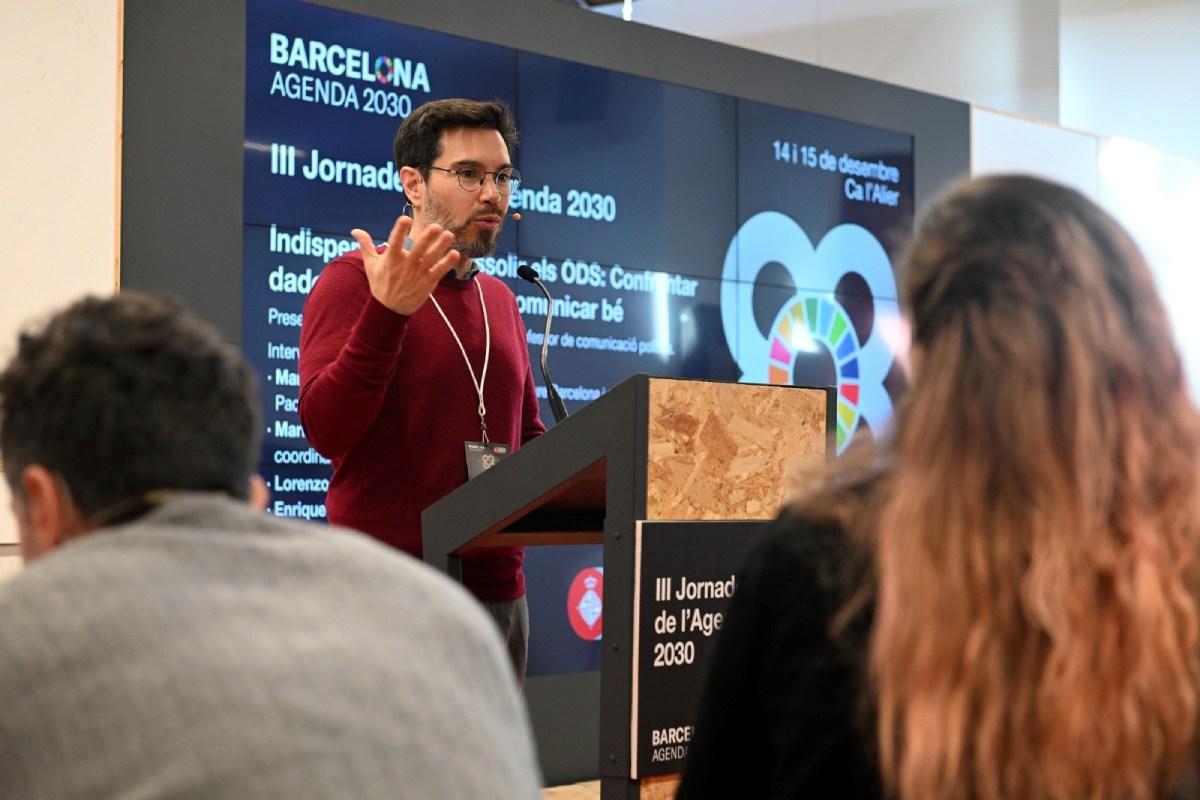
- About UPF-BSM
- Programs
- Faculty and research
- Companies and Organizations
- News & Events
Toni Aira takes part in the 3rd Agenda 2030 Conference
21 Diciembre - 2023
Toni Aira: “Citizens must approach our relationship with sustainability holistically”
In view of the fact that this year marks the halfway point of the journey towards to sustainability that the United Nations approved in 2015, known as the 17 Sustainable Development Goals (SDG), last week, the 3rd Agenda 2030 Conference was held at Ca l'Alier. At the event, the participants discussed strategies to ensure that the Barcelona of the future is fairer and more sustainable. The Professor at the UPF-BSM and Director of the Agbar Chair in Institutional Communication Studies for Sustainable Development and Growth, Toni Aira, took part as a speaker in a round table entitled “Essential for achieving the SDGs: Confronting data, debating ideas and communicating well”. He shared his insights into the current situation in terms of sustainable development, both in the city of Barcelona and around the world as a whole.
Although there is still a lot of progress to be made by 2030, Professor Aira is fairly optimistic. “The leap that we have made in just a few years should be given due credit, especially bearing in mind the immense scale of the challenge we are tackling: to survive as individuals and as a planet. A pessimist would tell us that there is nothing we can do and all the measures that we are taking to mitigate the most harmful effects of climate change are simply a case of fighting a losing battle. If that were the case, we should be focusing our efforts on inhabiting other planets. But, is it really all just a waste of time?”.
He went on to remark that, at least, we are increasingly sharing a more widespread and very necessary diagnosis. Moreover, we are starting to apply therapies that, while they may not yet have cured “the patient” completely, “the alternative would be to surrender to the worst aspects of ourselves as a species. Luckily, we are not at this stage socially. That in itself is a big step forward, accepting that it is necessary to embrace all the consequences”.
With respect to the city of Barcelona, Toni Aira acknowledges that there are still a lot of fronts open with a long way to go, such as progress in terms of decarbonization, where there is still a huge amount of work to be done. However, in general, he believes that there is cause to be optimistic. “It is important to recognize the progress that has been made in a big city like Barcelona with respect to the fight against climate change in just a few years”, he explained. “This has brings together a diverse range of fields that can be classified in the same areas that this conference focuses on: urban planning, green transition, urban services and housing."
"On all these fronts, we have taken significant leaps forward in terms of our SDG commitments” emphasized Dr. Aira.
In any case, we will not be able to take the final balance until we reach 2030 “and beyond”, emphasized the expert. “Also because reaching the SDGs, which we cannot just gauge in terms of measuring compliance/non-compliance, goes way beyond tangibles and also involves intangible aspects. In fact, observing and studying this world particularly focuses on institutional changes that reflect a social shift that is tackling this challenge at full throttle”.
The activities of the UPF-BSM’s Agbar Chair
On this issue, the Agbar Chair de Institutional Communication Studies for Sustainable Development and Growth of the UPF-BSM carries out a series of initiatives that, through communication but also in other ways, aim to gauge how institutions and social agents of all kinds are progressing in terms of the Sustainable Development Goals.
One example of these initiatives is the podcast "SDG Horizon: Beyond a commitment", in which different social, business and institutional stakeholders discuss and analyze how their commitment to the SDGs manifests itself. The idea behind the podcast is to get an overview, from various perspectives, of the progress being made towards achieving the SDGs in institutions, companies and other social agents who have a particular impact on the success or failure of this global commitment, as well as exploring the extent to which these advances are being made embracing all their consequences and driven by a sense of commitment.
Ultimately, concluded Toni Aira, to contribute towards achieving a sustainable urban model, “citizens must approach our relationship with sustainability holistically, treating it as a whole, rather than dealing with isolated symptoms. Everything from our individual environmental footprint right through to housing, transport, our consumption and many other aspects of our everyday lives as citizens, we can combine together to generate “glocal” success, merging the concepts of global and local”.